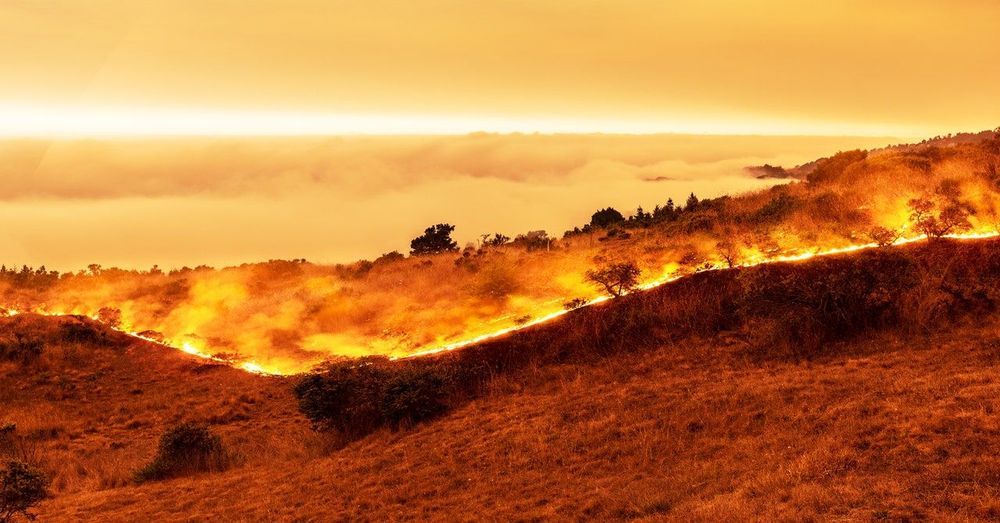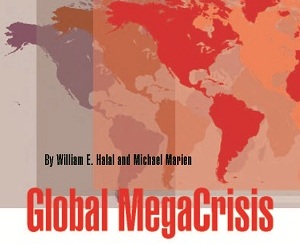Altering Earth’s geophysical environment is a moon shot—and it will be the only way to reverse the damage done. It’s time to take it more seriously.



Discovering chemical substances as possible chemical markers of life existence in Venus’s atmosphere via remote astronomical observations cannot be considered objective evidence of life existence on the planet, says Roscosmos Executive Director for Science and Advanced Programs Alexander Bloshenko. ‘Credible scientific data on that matter can be obtained only via contact explorations of the planet’s surface and atmosphere,’ he added.
Notably, the USSR was the only country to conduct regular explorations of Venus using on-planet stations. The first ever soft landing on another planet’s surface in the Solar system was performed in 1970 by the Venera-7 descent module. Several orbital missions and landings provided detailed data on the Venerian climate, soil and atmosphere composition. The Soviet Venera-13 spacecraft still holds the record as the longest active spacecraft on Venus remaining operational for 127 minutes.
A huge breakaway of the Soviet Union from its competitors in exploration of Venus contributed to the fact that USA called Venus a ‘Soviet planet’. Having recently analyzed the pictures of Venus captured by Soviet missions, scientists of the Russian Academy of Sciences claimed they discovered moving objects and even might be living. And it remains to be seen, whether these guesses are true.
Today, a program of complex exploration of Venus has been developed by Roscosmos in cooperation with the Russian Academy of Sciences. The program consists of several missions. Moreover, a decision was taken to implement the previously planned Venera-D mission including orbital and landing modules, as a national project without involving wide international cooperation. The complex explorations will also include soil and atmosphere samples, as well as exploring evolution processes on Venus that has purportedly suffered a climatic disaster connected with greenhouse effect that is much discussed on Earth today.

While the future of the clean energy proposal remains uncertain, the majority of Americans have been reading from the same page regarding what needs to be done: Dramatically cutting down the country’s reliance on fossil fuels over the next two decades is critical to lowering greenhouse gas (GHG) emissions and address climate change, with six in 10 U.S. adults saying they would favor policies with this energy goal. Thankfully, scientists have been researching alternative energy solutions like wind and solar power for decades, including lesser-known sources that may seem a little unusual or even downright ridiculous and unrealistic.
You can chalk up harvesting energy from blackholes to the latter category.
Fifty years ago, British mathematical physicist, Roger Penrose, proposed a seemingly absurd idea how an alien society (or future humans) could harvest energy from a rotating black hole by dropping an object just outside its sphere of influence also known as the ergosphere where it could gain negative energy. Since then, nobody has been able to verify the viability of this seemingly bizarre idea— that is until now.
Sign up for Policy Genius today: http://bit.ly/whatif-policygenius
Listen to our extended version of this episode on any podcasting platform: https://link.chtbl.com/type-ii-civilization
How cool would it be if we could one day regulate our atmosphere, control the climate and maybe even blast threatening asteroids into stardust? Well, to do those things would require A LOT of energy. Essentially, we’d have to be able to harness all the power from the Sun. According to the Kardashev scale that ranks planets according to their ability to harness the energy from their star and even their galaxy, that would make Earth a Type II civilization. What does that mean and how far away are we from achieving that level of uber energy capacity? You’ll have to tune in to find out as Peter and Richard welcome back Michio Kaku, physicist and science communicator extraordinaire to help us better understand “What If we became a type II civilization?”
Time codes:
0:00 What the episode is going to be about?
1:45 Are we a Type I civilization?
3:20 Who is Pr. Michio Kaku?
4:35 What is the Kardashev scale?
8:20 What does Type II mean?
9:45 How to expedite our evolution to advanced energy?
13:00 What if we were a Type II civilization?
15:50 Enjoy more from Pr. Kaku
18:20 Do you have life insurance?
20:50 Final thoughts
Can you translate this episode into another language? Add subtitles and we will link your YouTube channel in the description: https://www.youtube.com/timedtext_video?v=1JcDKNblGTs

Collective Intelligence to Solve the MegaCrisis
William E. Halal, The TechCast Project, George Washington University
The coronavirus is a stark reminder of the devastating damage that could be inflicted by cyberattacks, superbugs, freak weather and a variety of other threats. These wild cards are in addition to the existential challenge posed by climate change, gross inequality, financial meltdowns, autocratic governments, terrorism and other massive problems collectively called the Global MegaCrisis.
I sense the world is so frightened by recent disasters that people are searching for new solutions. They seem ready to break from the past that is no longer working. Climate change is starting to bite, for instance, and there is a growing consensus that the status quo is no longer sustainable.
I have studied this dilemma for decades, and I think it can be best understood as a transition to the next stage of social evolution. The Knowledge Age that dominated the last two decades is fading into the past as AI automates knowledge, forcing us to move beyond knowledge and develop a global consciousness able to resolve the MegaCrisis.
Yes, I know this is a bold claim, but that is how the shift to a world of knowledge looked 40 years ago. When computers filled rooms, I recall telling people that we were entering a world of personal computers. The typical response was “Why would anyone want a personal computer?”
Just so, today’s post-factual era illustrates how the smart phone, social media, and autocrats like Trump have moved public attention beyond knowledge and into a world of values, emotions and beliefs. Now the challenge is to use these new powers of social media to shape a global consciousness, or face disaster. While this may seem impossible, that is always the case before major upheavals. Nobody thought the USSR would collapse up until its very end.
In fact, the Business Roundtable’s recent announcement that business should move beyond the bottom line to include the interests of all stakeholders is revolutionary. It has now been promulgated by the World Economic Forum and other influential bodies. The gravity of this change is such that business is now being told to help resolve the climate crisis. Larry Fink, who runs the biggest investment firm in the world (Black Rock), directed the companies he owns to help address climate costs in their operations; within days, many firms announced climate plans.
This historic shift in consciousness could make corporations models of cooperation for society at large. In short, I think the world is heading toward some type of historic shift in consciousness, a collective epiphany, a code of global ethics, a spiritual revolution, a political paradigm shift or a new mindset. Without a consciousness based on global unity, cooperation and other essential beliefs, there seems little hope. And with a shift to global consciousness, it all seems possible.
Toward a Global Consciousness
The governing ideas inherited from the industrial past are outdated and heading toward disaster. It is a collapse of today’s reigning “materialist” ideology of Capitalism, economic growth, money, power, self-interest, rationality, knowledge, etc. These values remain valid and useful, of course, but they are now badly limited. Prevailing practices in the US, as the most prominent example, are failing to address the climate crisis, low wage employee welfare, universal health care, women’s rights, political gridlock, aging infrastructure and other social issues that lie beyond sheer economics.
This could become a “Collapse of Capitalism” roughly equivalent to the “Collapse of Communism” in the 1990s, and it stems from the same fatal flaw – failure to adapt to a changing world. Communism could not meet the complex demands of the Information Revolution, and now Capitalism seems to be failing to adapt to a unified globe threatened by pandemics, climate change and the other threats making up the MegaCrisis.
The big question remaining is, “What should be the new vision, values, principles, and policies?” At the risk of appearing pedantic, I integrate what has been learned above and my forthcoming book, Beyond Knowledge, to outline five principles of what I consider “global consciousness.”
1. Treat the planet and all life forms as sacred. The Fermi Paradox notes that no other civilizations have been detected after decades of SETI searching. This rarity of life reminds us what a miracle plant Earth really is, and that we are responsible for its well-being.
2. Govern the world as a unified whole. Nations remain the major players in this global order, but they should be lightly governed by some type of global institution like the UN and other international bodies. Individuals should continue to be loyal to their nations and local institutions, but they should also accept their role as global citizens.
3. Collaborate With All Stakeholders. Free enterprise is the basis of society, and the good news is that business is on the verge of becoming cooperative. The Business Roundtable announcement that all stakeholders should be treated equally with investors seems an historic breakthrough. This move to a quasi-democratic form of enterprise could set a new standard for collaborative behavior and human values throughout modern societies. One of the benefits from a tragedy like this crisis may be a loss of faith in the status quo and an urge to cooperate. I see it everywhere, and it is a blessing in disguise emerging out of chaos.
4. Embrace diversity as an asset. Rather than becoming a uniform pallid bureaucracy, a unified world should embrace the wondrous diversity of cultures and individuals. Working across such differences poses a challenge, naturally, but differences are also a source of new knowledge, talents and human energy.
5. Celebrate Community. Any society needs frequent opportunities to gather together in good spirit, enjoy differences and commonalities, and to simply celebrate the glory of life. The World Olympics Games, for instance, are special because they provide a rare feeling of global community. We could witness a flowering of celebratory events over the coming years to nourish the global soul.
Shaping Consciousness
This is only one small study, of course, but I hope it provokes thinking toward a widely held vision for planet Earth at a time of crisis. An historic change in consciousness is hardly done overnight, and the obstacles posed by the status quo are formidable. But the Information Revolution provides a powerful method for shaping consciousness by using the Internet and public media. Think of the explosion of ideas, hatred and forbidden desires released by billions of people blasting into loudspeakers like Facebook and Twitter. Anybody can use the media to shape public opinion instantly, for better or worse.
The task we face is to shape a unified consciousness out of this morass of differences to solve the global crises that loom ahead. Today’s threats to reason is challenging us to counter wrongheaded beliefs and to provide more attractive visions, such as the principles for global consciousness outlined here. I suggest the place to begin is by discussing these ideas as widely as possible, and to shape public opinion roughly along these lines.
Sign up for our newsletter at www.TechCastproject.com

Researchers have discovered how a protein in plant roots controls the uptake of minerals and water, a finding which could improve the tolerance of agricultural crops to climate change and reduce the need for chemical fertilizers.
The research, published in Current Biology, shows that members of the blue copper proteins family, the Uclacyanins are vital in the formation of Casparian strips. These strips are essential structures that control mineral nutrient and water use efficiencies by forming tight seals between cells in plants, blocking nutrients and water leaking between.
This is the first evidence showing the implications of this family in the biosynthesis of lignin, one of the most abundant organic polymers on earth. This study reveals that the molecular machinery required for Casparian strip lignin deposition is highly ordered by forming nano-domains which can have a huge impact on plant nutrition, a finding that could help in the development of crops that are efficient in taking in the nutrients they need.

Giant balloons launched into the stratosphere to beam internet service to Earth have helped scientists measure tiny ripples in our upper atmosphere, uncovering patterns that could improve weather forecasts and climate models.
The ripples, known as gravity waves or buoyancy waves, emerge when blobs of air are forced upward and then pulled down by gravity. Imagine a parcel of air that rushes over mountains, plunges toward cool valleys, shuttles across land and sea and ricochets off growing storms, bobbing up and down between layers of stable atmosphere in a great tug of war between buoyancy and gravity. A single wave can travel for thousands of miles, carrying momentum and heat along the way.
Although lesser known than gravitational waves —undulations in the fabric of space-time— atmospheric gravity waves are ubiquitous and powerful, said Stanford University atmospheric scientist Aditi Sheshadri, senior author of a new study detailing changes in high-frequency gravity waves across seasons and latitudes. They cause some of the turbulence felt on airplanes flying in clear skies and have a strong influence on how storms play out at ground level.
This week:
🚀 The first piece of NASA’s Orion Spacecraft #Artemis III pressure vessel arrived in New Orleans
👩🏿🚀 Astronaut Jeanette Epps is assigned to The Boeing Company’s Starliner crewed mission
🌀 Hurricane Laura observed from space.

Nearby supernova explosions shape the interstellar medium. Ejecta, containing fresh nucleosynthetic products, may traverse the solar system as a transient passage, or alternatively the solar system may traverse local clouds that may represent isolated remnants of supernova explosions. Such scenarios may modulate the galactic cosmic-ray flux intensity to which Earth is exposed. Varying conditions of the traversed interstellar medium could have impacts on climate and can be imprinted in the terrestrial geological record. Some radionuclides, such as 60 Fe, are not produced on Earth or within the solar system in significant quantities. Their existence in deep-sea sediments demonstrates recent production in close-by supernova explosions with a continued influx of 60 Fe until today.
Nuclides synthesized in massive stars are ejected into space via stellar winds and supernova explosions. The solar system (SS) moves through the interstellar medium and collects these nucleosynthesis products. One such product is 60 Fe, a radionuclide with a half-life of 2.6 My that is predominantly produced in massive stars and ejected in supernova explosions. Extraterrestrial 60 Fe has been found on Earth, suggesting close-by supernova explosions ∼2 to 3 and ∼6 Ma. Here, we report on the detection of a continuous interstellar 60 Fe influx on Earth over the past ∼33,000 y. This time period coincides with passage of our SS through such interstellar clouds, which have a significantly larger particle density compared to the local average interstellar medium embedding our SS for the past few million years. The interstellar 60 Fe was extracted from five deep-sea sediment samples and accelerator mass spectrometry was used for single-atom counting.

It’s extremely difficult to make a fair comparison of US and Chinese spend on technology like AI as funding and research in this area is diffuse. Although China announced ambitious plans to become the world leader in AI by 2030, America still outspends the country in military funding (which increasingly includes AI research), while US tech companies like Google and Microsoft remain world leaders in artificial intelligence.
The Trump administration will likely present today’s news as a counterbalance to its dismal reputation for supporting scientific research. For four years in a row, government budgets have proposed broad cuts for federal research, including work in pressing subjects like climate change. Only the fields of artificial intelligence and quantum computing, with their overt links to military prowess and global geopolitics, have seen increased investment.
“It is absolutely imperative the United States continues to lead the world in AI and quantum,” said US Chief Technology Officer Michael Kratsios ahead of today’s announcement, according to The Wall Street Journal. “The future of American economic prosperity and national security will be shaped by how we invest, research, develop and deploy these cutting edge technologies today.”